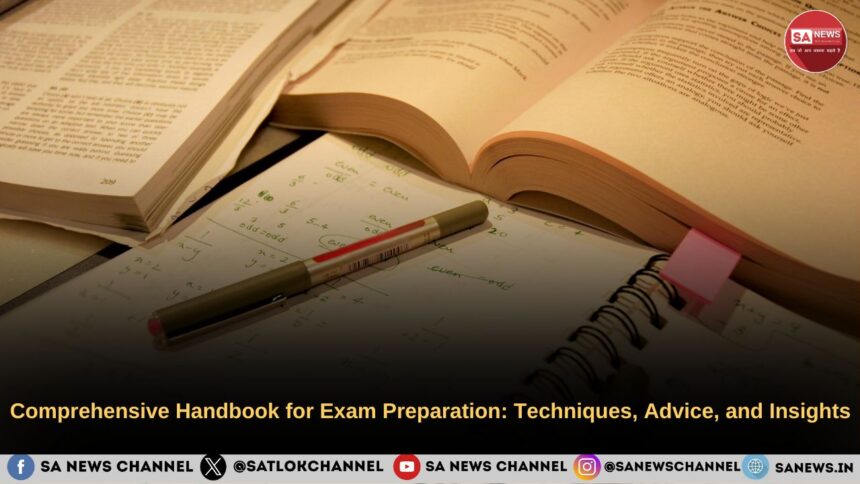The process of preparing for examinations can often feel overwhelming; however, by employing appropriate strategies and cultivating a positive mindset, you can excel in your assessments and reach your educational objectives. This detailed handbook will provide you with essential information regarding efficient exam preparation, including the development of a study schedule and the mastery of test-taking strategies.
- Recognizing the Significance of Exam Preparation
- Exam Preparation: Formulating a Comprehensive Study Plan
- Exam Preparation: Time Management Strategies
- Active Learning Strategies
- Utilizing Study Resources
- Exam Preparation: Practice and Review
- Exam Preparation: Test-Taking Strategies
- Self-Care and Stress Management
- Maintain Motivation
- Exam Preparation: Texts and Reference Materials
- Exam Preparation: Digital Resources
- Exam Preparation: Collaborative Learning
- Exam Day Preparation
- The Day Prior to the Exam
- On the Day of the Exam
- Exam Preparation: Reflect and Enhance
- Evaluate Your Performance
- Strategize for the Future
- Conclusion
- Achieving Liberation: A Spiritual Journey According to Sant Rampal Ji Maharaj
- FAQs About Exam Preparation
- Connect With Us on the Following Social Media Platforms
Additionally, explore the significance of self-care and methods to maintain motivation during this journey.
Recognizing the Significance of Exam Preparation
Effective exam preparation is essential for achieving academic excellence. It not only aids in comprehending and retaining information but also fosters self-assurance and alleviates stress. Adequate preparation equips you to handle various question formats and manage your time proficiently during examinations.
Exam Preparation: Formulating a Comprehensive Study Plan
1. Evaluate Your Study Requirements
Prior to developing a study plan, evaluate your strengths and weaknesses across different subjects. Identify the areas that need more focus and allocate your study time accordingly.
2. Establish Attainable Objectives
Formulate specific, measurable, achievable, relevant, and time-bound (SMART) objectives for your study sessions. Divide your goals into smaller, more achievable tasks.
3. Create a Study Timetable
Design a study timetable that aligns with your daily activities. Assign specific time slots for each subject and adhere to your timetable. Ensure to incorporate breaks to prevent fatigue.
Exam Preparation: Time Management Strategies
1. Rank Your Tasks
Rank your study tasks according to their significance and deadlines. Concentrate on high-priority tasks initially and address less urgent ones subsequently.
2. Implement the Pomodoro Technique
The Pomodoro Technique consists of working for 25 minutes followed by a 5-minute break. After finishing four Pomodoro sessions, it is advisable to take an extended break. This method enhances focus and productivity.
3. Combat Procrastination
Recognize the factors contributing to your procrastination and tackle them. Divide your tasks into smaller steps and establish deadlines to maintain accountability.
Active Learning Strategies
1. Note-Taking
Exam Preparation: Engaging in note-taking is essential for solidifying your understanding. Employ various methods such as the Cornell technique, mind mapping, or outlining to systematically arrange your notes.
2. Incorporate Visual Aids
Utilizing visual aids like charts, diagrams, and flashcards can enhance your comprehension of intricate concepts and improve information retention.
3. Teach Others
Explaining what you have learned to another individual serves as an effective method to strengthen your knowledge and uncover any areas where your understanding may be lacking.
Utilizing Study Resources
1. Textbooks and Lecture Notes
Exam Preparation: Make your textbooks and lecture notes your primary study materials. Emphasize key points and create summaries for efficient revision.
2. Online Learning Platforms
Leverage online resources, including educational websites, video lectures, and online courses to enhance your learning experience.
3. Collaborative Study Groups
Participate in study groups to work alongside your peers. Engaging in discussions can offer fresh insights and deepen your grasp of the subject matter.
■ Also Read: Financial Management for Start-ups: The Critical Ingredient Most Fail to Master
Exam Preparation: Practice and Review
1. Complete Practice Tests
Taking practice tests is an effective method to evaluate your knowledge and pinpoint areas that require further attention. Conduct timed practice tests to mimic actual exam conditions.
2. Analyze Previous Exam Papers
Examine past exam papers to become acquainted with the exam structure and types of questions. This preparation will help you anticipate what to expect and how to tackle various questions.
3. Consistent Review Sessions
Establish a routine of regular review sessions to revisit the material you have studied. Consistent review is crucial for reinforcing your memory and ensuring long-term retention.
Exam Preparation: Test-Taking Strategies
1. Thoroughly Examine Instructions
Exam Preparation: Prior to starting the examination, it is essential to carefully examine the instructions provided. Understanding the format, grading criteria, and any specific requirements is vital for success.
2. Effective Time Allocation
Allocate your time judiciously across the various sections of the exam, considering both the number of questions and their level of difficulty. Keep a close watch on the time and move on to the next question if you face challenges.
3. Focus on Easier Questions First
Start with the questions that you find most straightforward. This strategy will help you build confidence and quickly gather points, enabling you to concentrate on the more challenging questions later on.
4. Review Your Answers
Exam Preparation: If time permits, take the opportunity to review your responses before submitting the exam. Check for any mistakes or incomplete answers and make the necessary corrections.
Self-Care and Stress Management
- Prioritize Sleep
Aim for 7-8 hours of sleep each night, especially before exams, as it enhances memory and cognitive function. Develop a regular sleep pattern and implement a soothing pre-sleep routine. Reduce screen exposure one hour prior to bedtime to enhance the quality of sleep.
- Maintain a Healthy Diet
Exam Preparation: Consume a well-rounded diet that is abundant in fruits, vegetables, whole grains, and lean proteins. Incorporate omega-3 fatty acids and antioxidants to promote optimal brain health. Stay hydrated and plan meals to avoid unhealthy snacks. Limit caffeine and sugar to prevent energy crashes.
- Engage in Regular Exercise
Incorporate at least 30 minutes of moderate exercise most days to reduce stress and boost mood and energy levels. Engaging in activities such as walking or jogging can provide significant benefits.
Maintain Motivation
- Set Up Incentives:
Create a reward system to enhance motivation by treating yourself for reaching academic milestones, like completing assignments or achieving grades. Rewards can be simple, like a favorite snack or a day off, making the process enjoyable.
- Positive Perspective:
Exam Preparation: Maintain a positive outlook by practicing daily and have gratitude for aspects of your academic life, such as supportive teachers. Use visualization techniques to imagine achieving your goals and surround yourself with motivational quotes for inspiration.
- Encouragement System:
Build a support network with friends, family, and peers who understand your journey. Form study groups or accountability partnerships for shared goals and regular check-ins. Don’t hesitate to seek help or discuss challenges; you’re not alone in this journey.
- Maximize Available Resources
Leverage the resources at your disposal to enhance your study efforts.
Exam Preparation: Texts and Reference Materials
Textbooks:
Adhere to the suggested textbooks to gain a comprehensive understanding of the subject matter. Textbooks are often structured to provide a logical progression of concepts, making them invaluable for building foundational knowledge. Make it a habit to read the assigned chapters thoroughly, take notes, and highlight key points to reinforce your learning.
Reference Materials:
Consult study guides and revision books for succinct overviews and summaries of complex topics. These materials can serve as excellent tools for quick reviews before exams or for clarifying difficult concepts. Look for resources that include practice questions and answers, as they can help you test your understanding and identify areas that need further study.
Exam Preparation: Digital Resources
Educational Platforms:
Access platforms for supplementary education. These platforms offer a wealth of courses across various subjects, often taught by experts in the field. Take advantage of their interactive exercises and quizzes to reinforce your learning. Many of these courses are free or low-cost, making them easily available to everyone.
YouTube Channels:
Exam Preparation: Subscribe to educational channels for instructional videos and lectures. YouTube hosts a plethora of content creators who specialize in educational material, providing visual and auditory learning opportunities. Look for channels that align with your curriculum or areas of interest, and consider creating a playlist of videos that you can refer back to as needed.
Applications:
Employ applications like Quizlet and Anki for creating flashcards and conducting quizzes. These tools can help you memorize important terms, definitions, and concepts through spaced repetition, which is proven to enhance retention. Additionally, many of these applications allow you to share your flashcards with peers, facilitating collaborative study sessions.
Exam Preparation: Collaborative Learning
Peer Engagement:
Engage in study groups to foster collaborative learning and exchange insights. Working with peers can provide different perspectives on the material, making it easier to grasp challenging concepts. Schedule regular study sessions where you can discuss topics, quiz with each other, and share resources. This not only enhances understanding but also keeps you motivated and accountable.
Online Discussion Boards:
Take part in online forums to resolve queries and gain diverse viewpoints. Websites like Reddit, Stack Exchange, and specialized academic forums can be excellent places to ask questions and engage in discussions with others who share your interests. Participating in these communities can expose you to new ideas and approaches, enriching your overall learning.
Exam Day Preparation
Exam Preparation: Effective preparation for the day of the exam is vital for reducing anxiety and enhancing performance. A well-structured approach can make a significant difference in how you feel and perform during the exam. Below are detailed strategies to ensure you are fully prepared.
The Day Prior to the Exam
Final Review
Exam Preparation: Conduct a thorough review of your notes and summaries one final time. This is not the time for cramming; instead, focus on reinforcing your understanding of key concepts. Use active recall techniques, such as quizzing yourself or teaching the material to someone else, to solidify your knowledge.
Gather Essentials
Confirm that you have all required materials ready for the exam. This includes your admission ticket, writing instruments (pens, pencils, erasers), identification, and any other necessary items such as calculators or reference sheets. Organizing these items the night before can help alleviate stress on exam day.
On the Day of the Exam
Nutritious Breakfast
Consume a healthy breakfast to sustain your energy throughout the exam. Choose a well-rounded meal that incorporates protein, whole grains, and a selection of fruits or vegetables. Foods like oatmeal, yogurt, and smoothies can provide the necessary nutrients to keep your mind sharp and focused.
Timely Arrival
Arrive at the examination location well in advance to prevent any last-minute pressure. Aim to arrive at least 30 minutes early, allowing yourself time to settle in, find your seat, and mentally prepare. This buffer can help you avoid the stress of unexpected delays.
Maintain Composure
Engage in deep breathing exercises and remain composed during the examination. If you start to feel anxious, take a moment to close your eyes, breathe deeply, and focus on calming your mind. Visualizing success and reminding yourself of your preparation can also help maintain a positive mindset.
Exam Preparation: Reflect and Enhance
Post-examination reflection is essential for personal and academic growth, allowing individuals to assess their performance and make informed decisions for improvement.
Evaluate Your Performance
Strengths and Areas for Growth:
Begin by assessing your exam performance. Identify strengths, such as subjects you excelled in and effective strategies like time management. Also, recognize areas for improvement by reflecting on challenging questions and potential knowledge gaps.
Feedback:
Seek insights from educators or peers to understand your performance better. Their feedback can reveal common pitfalls and effective strategies to refine your approach.
Strategize for the Future
Modify Study Approaches:
Adjust your study methods based on your evaluation. Consider active learning, collaborative sessions, or new resources like online tutorials. Experiment with different study schedules to find what works best for you, and reflect on test-taking strategies, especially if anxiety affects your performance.
Set New Goals:
Exam Preparation: Continuous improvement is vital for personal growth. After assessing your performance and refining your study methods, create new academic goals that are challenging yet achievable, such as mastering a subject, raising your GPA, or developing critical thinking skills.
Ensure your goals follow the SMART criteria: Specific, Measurable, Achievable, Relevant, and Time-bound. For instance, instead of a vague goal like “improve in mathematics,” aim for “achieve 85% or higher on the next math exam through problem-solving practice.”
Conclusion
By following these tips and techniques on how to prepare for exams, you can feel more confident and prepared when it comes time to sit for your exams. Remember to start early, stay consistent, and practice active learning strategies to maximize your study sessions. With dedication and hard work, you can achieve academic success and ace your exams with flying colors.
Achieving Liberation: A Spiritual Journey According to Sant Rampal Ji Maharaj
To embark on the spiritual journey as imparted by Sant Rampal Ji Maharaj and to attain liberation from the cycle of birth and death, one must adhere to a structured regimen of spiritual practice and devotion. The following are essential steps to consider:
1. Comprehending the Teachings
Study the Scriptures: Initiate your journey by delving into the sacred texts and teachings of Sant Rampal Ji Maharaj. This encompasses grasping the concepts of Satlok, the ultimate realm, and the significance of Gyan (knowledge).
Attend Satsangs: Make it a point to regularly participate in spiritual discourses and satsangs led by Sant Rampal Ji Maharaj to gain profound insights and clarity regarding the spiritual path.
2. Engaging in Devotion
Chanting Mantras: Dedicate time each day to chant mantras and prayers as instructed by Sant Rampal Ji Maharaj. This practice aids in the purification of the mind and soul.
Meditation: Incorporate meditation into your routine to attain inner tranquility and establish a connection with the divine. This practice enhances focus and diminishes worldly distractions.
3. Upholding a Virtuous Life
Follow the Five Vows: Commit to the five vows of non-violence, truthfulness, non-stealing, celibacy, and non-attachment. Adhering to these vows purifies one’s actions and thoughts.
Serve Others: Participate in selfless service and assist those in need. Engaging in service fosters humility and compassion.
4. Seeking Guidance
Consult the Guru: Regularly seek counsel from Sant Rampal Ji Maharaj or His designated representatives. The guru offers tailored advice and support throughout the spiritual journey.
Join a Spiritual Community: Becoming part of a spiritual community can provide essential support, encouragement, and a sense of belonging.
5. Self-Reflection and Improvement
Self-Analysis: Engage in ongoing self-assessment of your thoughts, actions, and intentions. Recognize areas for improvement and implement necessary changes.
Stay Committed: Maintain your commitment to the spiritual path, even in the face of challenges and obstacles. Persistence and dedication are crucial for achieving spiritual advancement.
6. Embracing the Spiritual Path
Adopt a Minimalist Lifestyle: Streamline your way of living and prioritize spiritual endeavors over materialistic aspirations.
Foster Constructive Thoughts: Substitute negative thoughts with uplifting ones. Engaging in positive thinking contributes to a tranquil and concentrated mind
By adhering to these principles and remaining committed to the teachings of Sant Rampal Ji Maharaj, individuals can advance on their spiritual journey and ultimately achieve liberation from the cycle of birth and death. To know more visit sant Rampal Ji maharaj youtube channel.
FAQs About Exam Preparation
Q: How can I improve my memory retention for exams?
A: To improve memory retention, try using mnemonic devices, creating flashcards, and practicing retrieval techniques such as self-testing.
Q: Is it better to study alone or in a group?
A: The answer depends on personal preference, but a combination of individual study sessions and group study can be beneficial for exam preparation.









